Leadership and Management Strategies for Service Industries: Marriott
VerifiedAdded on 2023/01/05
|11
|3674
|94
Report
AI Summary
This report provides a comprehensive analysis of leadership and management practices within Marriott International, a prominent organization in the hospitality sector. The report begins with an introduction to leadership concepts and then delves into classical management theories relevant to the service industry, focusing on administrative, bureaucratic, and scientific management approaches. It examines the roles of leaders and various leadership styles, including autocratic, democratic, transactional, and strategic leadership, and how these styles are applied at Marriott. The report then explores internal and external factors that influence management styles, such as organizational culture, employee engagement, economic conditions, technological advancements, social factors, and legal regulations. Furthermore, it identifies and discusses the hard and soft skills essential for effective management and leadership in the service sector, along with skills needed in the future. Finally, the report compares and contrasts change management systems and leadership approaches, offering valuable insights into the dynamic nature of management within the hospitality industry.
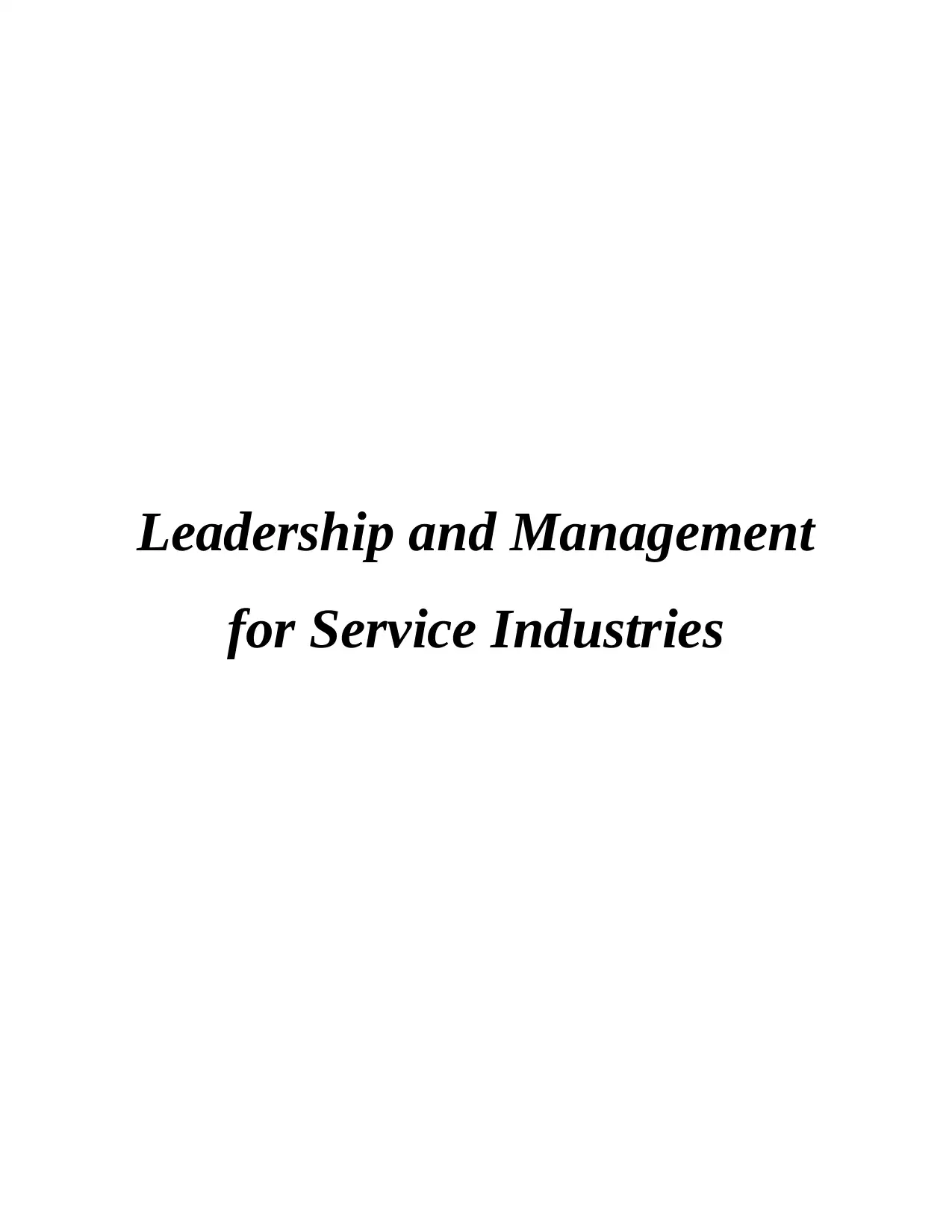
Leadership and Management
for Service Industries
for Service Industries
Paraphrase This Document
Need a fresh take? Get an instant paraphrase of this document with our AI Paraphraser
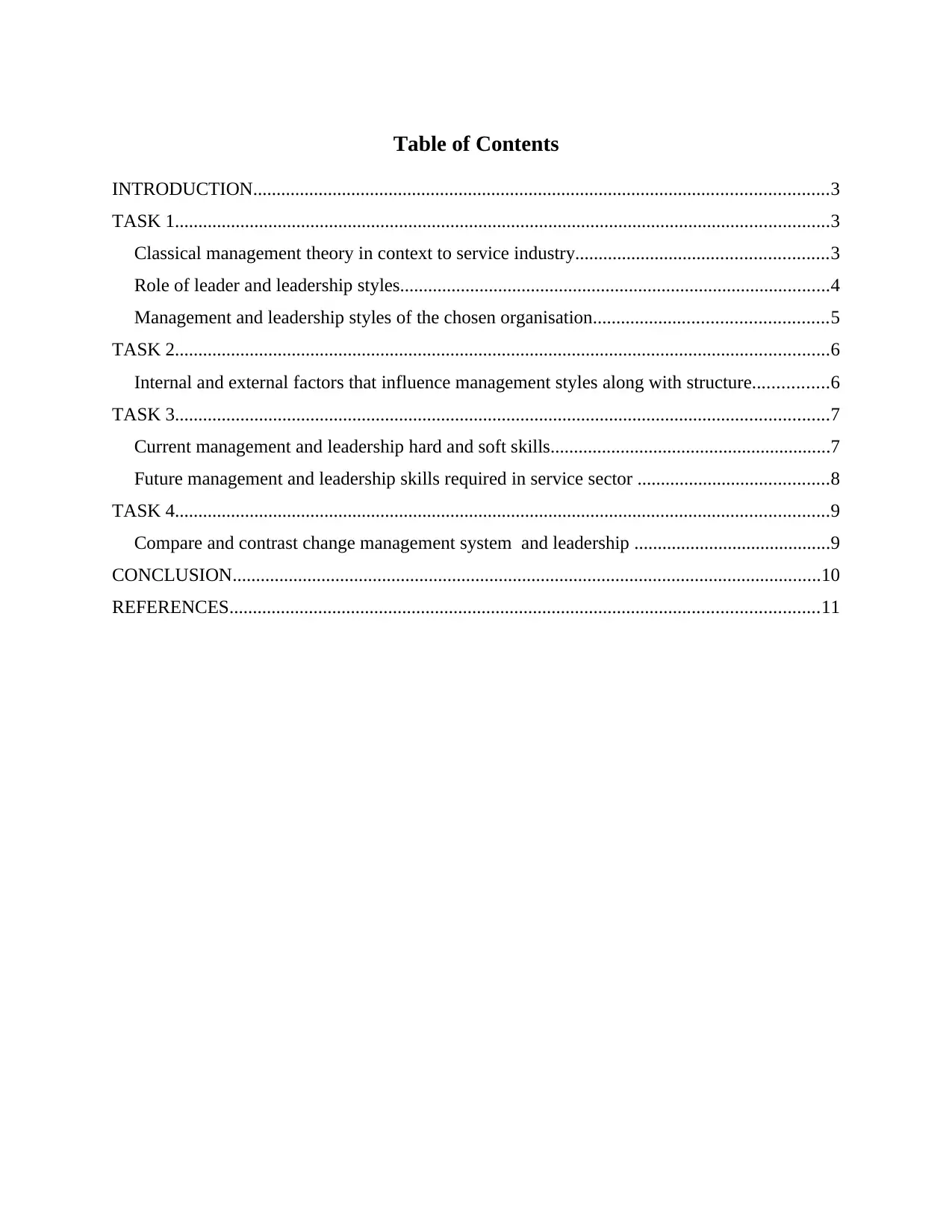
Table of Contents
INTRODUCTION...........................................................................................................................3
TASK 1............................................................................................................................................3
Classical management theory in context to service industry......................................................3
Role of leader and leadership styles............................................................................................4
Management and leadership styles of the chosen organisation..................................................5
TASK 2............................................................................................................................................6
Internal and external factors that influence management styles along with structure................6
TASK 3............................................................................................................................................7
Current management and leadership hard and soft skills............................................................7
Future management and leadership skills required in service sector .........................................8
TASK 4............................................................................................................................................9
Compare and contrast change management system and leadership ..........................................9
CONCLUSION..............................................................................................................................10
REFERENCES..............................................................................................................................11
INTRODUCTION...........................................................................................................................3
TASK 1............................................................................................................................................3
Classical management theory in context to service industry......................................................3
Role of leader and leadership styles............................................................................................4
Management and leadership styles of the chosen organisation..................................................5
TASK 2............................................................................................................................................6
Internal and external factors that influence management styles along with structure................6
TASK 3............................................................................................................................................7
Current management and leadership hard and soft skills............................................................7
Future management and leadership skills required in service sector .........................................8
TASK 4............................................................................................................................................9
Compare and contrast change management system and leadership ..........................................9
CONCLUSION..............................................................................................................................10
REFERENCES..............................................................................................................................11
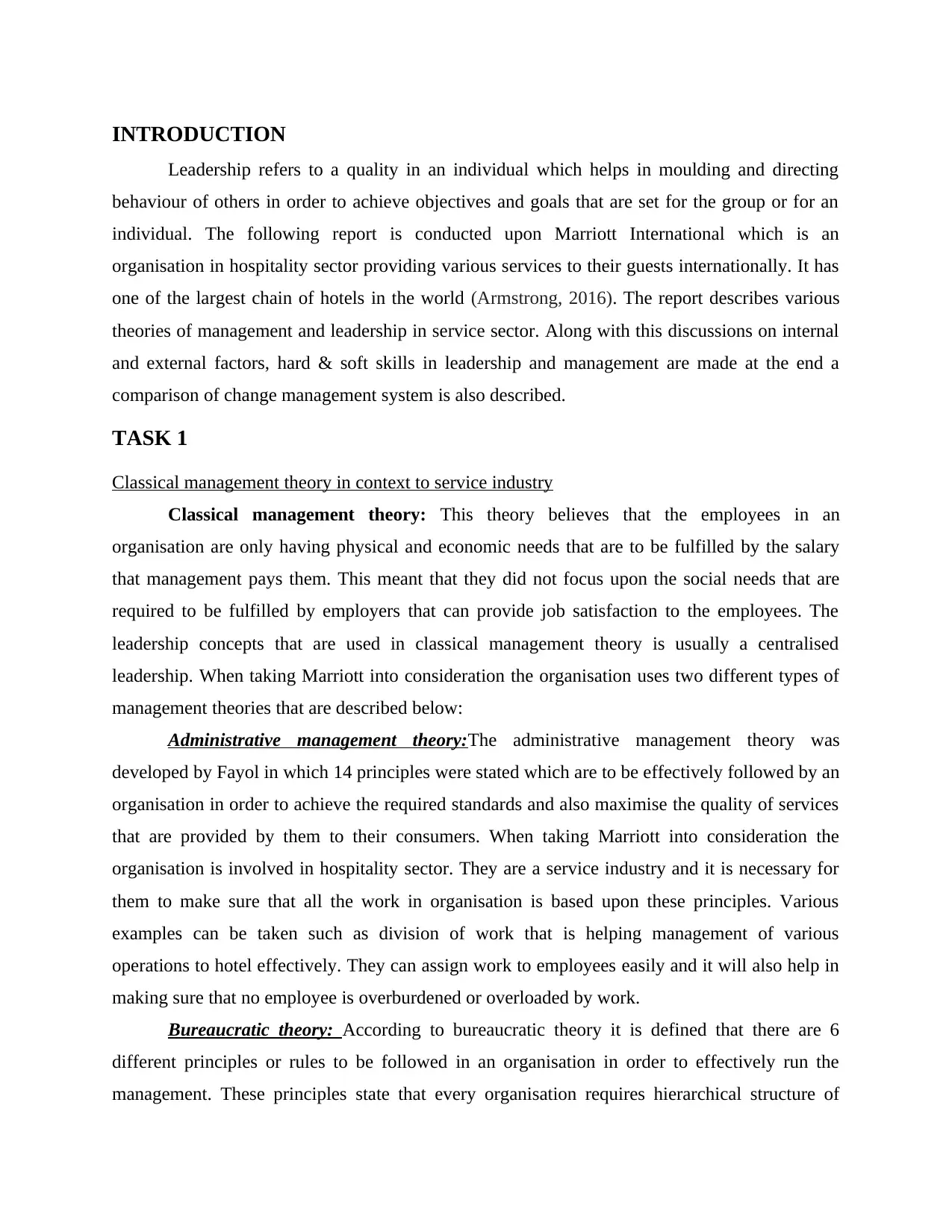
INTRODUCTION
Leadership refers to a quality in an individual which helps in moulding and directing
behaviour of others in order to achieve objectives and goals that are set for the group or for an
individual. The following report is conducted upon Marriott International which is an
organisation in hospitality sector providing various services to their guests internationally. It has
one of the largest chain of hotels in the world (Armstrong, 2016). The report describes various
theories of management and leadership in service sector. Along with this discussions on internal
and external factors, hard & soft skills in leadership and management are made at the end a
comparison of change management system is also described.
TASK 1
Classical management theory in context to service industry
Classical management theory: This theory believes that the employees in an
organisation are only having physical and economic needs that are to be fulfilled by the salary
that management pays them. This meant that they did not focus upon the social needs that are
required to be fulfilled by employers that can provide job satisfaction to the employees. The
leadership concepts that are used in classical management theory is usually a centralised
leadership. When taking Marriott into consideration the organisation uses two different types of
management theories that are described below:
Administrative management theory:The administrative management theory was
developed by Fayol in which 14 principles were stated which are to be effectively followed by an
organisation in order to achieve the required standards and also maximise the quality of services
that are provided by them to their consumers. When taking Marriott into consideration the
organisation is involved in hospitality sector. They are a service industry and it is necessary for
them to make sure that all the work in organisation is based upon these principles. Various
examples can be taken such as division of work that is helping management of various
operations to hotel effectively. They can assign work to employees easily and it will also help in
making sure that no employee is overburdened or overloaded by work.
Bureaucratic theory: According to bureaucratic theory it is defined that there are 6
different principles or rules to be followed in an organisation in order to effectively run the
management. These principles state that every organisation requires hierarchical structure of
Leadership refers to a quality in an individual which helps in moulding and directing
behaviour of others in order to achieve objectives and goals that are set for the group or for an
individual. The following report is conducted upon Marriott International which is an
organisation in hospitality sector providing various services to their guests internationally. It has
one of the largest chain of hotels in the world (Armstrong, 2016). The report describes various
theories of management and leadership in service sector. Along with this discussions on internal
and external factors, hard & soft skills in leadership and management are made at the end a
comparison of change management system is also described.
TASK 1
Classical management theory in context to service industry
Classical management theory: This theory believes that the employees in an
organisation are only having physical and economic needs that are to be fulfilled by the salary
that management pays them. This meant that they did not focus upon the social needs that are
required to be fulfilled by employers that can provide job satisfaction to the employees. The
leadership concepts that are used in classical management theory is usually a centralised
leadership. When taking Marriott into consideration the organisation uses two different types of
management theories that are described below:
Administrative management theory:The administrative management theory was
developed by Fayol in which 14 principles were stated which are to be effectively followed by an
organisation in order to achieve the required standards and also maximise the quality of services
that are provided by them to their consumers. When taking Marriott into consideration the
organisation is involved in hospitality sector. They are a service industry and it is necessary for
them to make sure that all the work in organisation is based upon these principles. Various
examples can be taken such as division of work that is helping management of various
operations to hotel effectively. They can assign work to employees easily and it will also help in
making sure that no employee is overburdened or overloaded by work.
Bureaucratic theory: According to bureaucratic theory it is defined that there are 6
different principles or rules to be followed in an organisation in order to effectively run the
management. These principles state that every organisation requires hierarchical structure of
⊘ This is a preview!⊘
Do you want full access?
Subscribe today to unlock all pages.

Trusted by 1+ million students worldwide
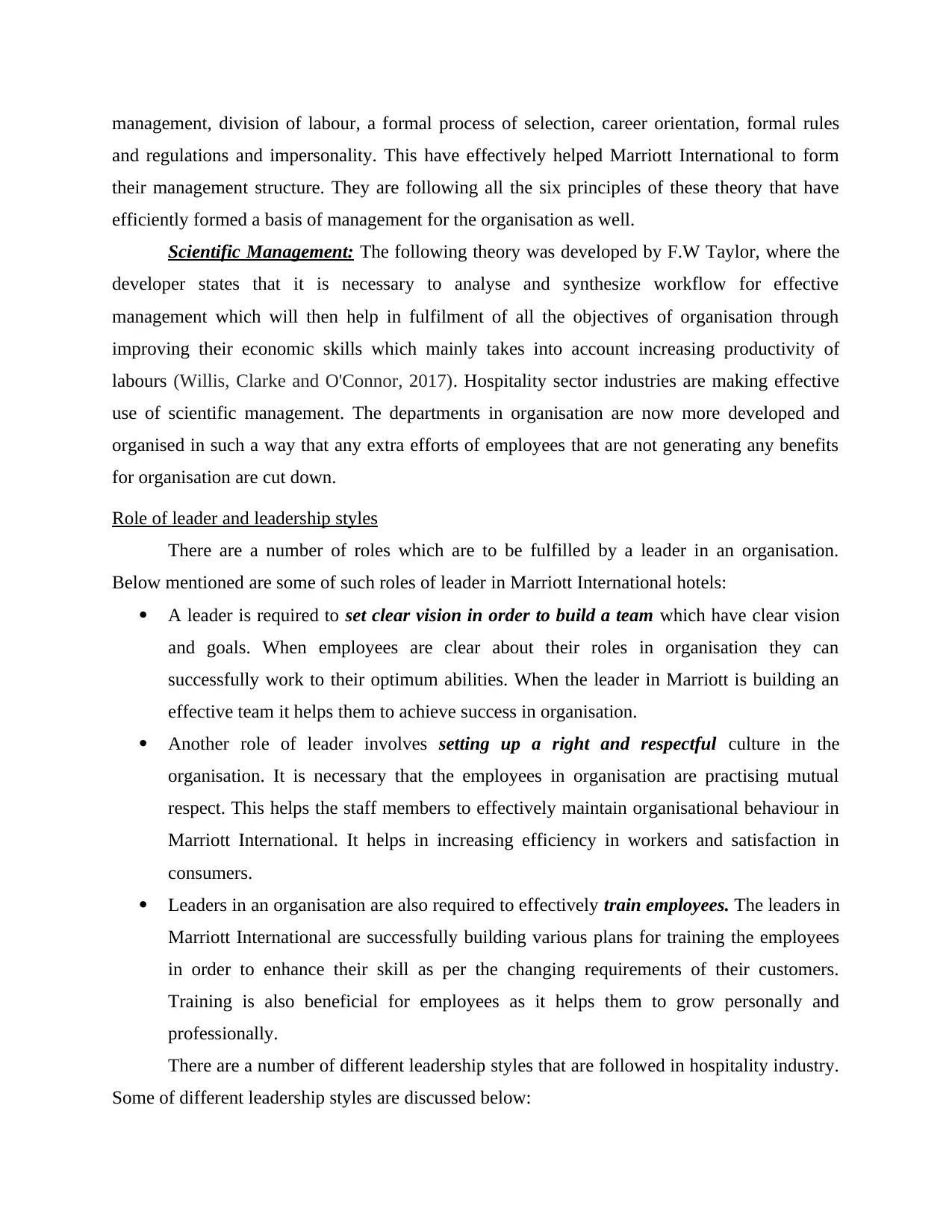
management, division of labour, a formal process of selection, career orientation, formal rules
and regulations and impersonality. This have effectively helped Marriott International to form
their management structure. They are following all the six principles of these theory that have
efficiently formed a basis of management for the organisation as well.
Scientific Management: The following theory was developed by F.W Taylor, where the
developer states that it is necessary to analyse and synthesize workflow for effective
management which will then help in fulfilment of all the objectives of organisation through
improving their economic skills which mainly takes into account increasing productivity of
labours (Willis, Clarke and O'Connor, 2017). Hospitality sector industries are making effective
use of scientific management. The departments in organisation are now more developed and
organised in such a way that any extra efforts of employees that are not generating any benefits
for organisation are cut down.
Role of leader and leadership styles
There are a number of roles which are to be fulfilled by a leader in an organisation.
Below mentioned are some of such roles of leader in Marriott International hotels:
A leader is required to set clear vision in order to build a team which have clear vision
and goals. When employees are clear about their roles in organisation they can
successfully work to their optimum abilities. When the leader in Marriott is building an
effective team it helps them to achieve success in organisation.
Another role of leader involves setting up a right and respectful culture in the
organisation. It is necessary that the employees in organisation are practising mutual
respect. This helps the staff members to effectively maintain organisational behaviour in
Marriott International. It helps in increasing efficiency in workers and satisfaction in
consumers.
Leaders in an organisation are also required to effectively train employees. The leaders in
Marriott International are successfully building various plans for training the employees
in order to enhance their skill as per the changing requirements of their customers.
Training is also beneficial for employees as it helps them to grow personally and
professionally.
There are a number of different leadership styles that are followed in hospitality industry.
Some of different leadership styles are discussed below:
and regulations and impersonality. This have effectively helped Marriott International to form
their management structure. They are following all the six principles of these theory that have
efficiently formed a basis of management for the organisation as well.
Scientific Management: The following theory was developed by F.W Taylor, where the
developer states that it is necessary to analyse and synthesize workflow for effective
management which will then help in fulfilment of all the objectives of organisation through
improving their economic skills which mainly takes into account increasing productivity of
labours (Willis, Clarke and O'Connor, 2017). Hospitality sector industries are making effective
use of scientific management. The departments in organisation are now more developed and
organised in such a way that any extra efforts of employees that are not generating any benefits
for organisation are cut down.
Role of leader and leadership styles
There are a number of roles which are to be fulfilled by a leader in an organisation.
Below mentioned are some of such roles of leader in Marriott International hotels:
A leader is required to set clear vision in order to build a team which have clear vision
and goals. When employees are clear about their roles in organisation they can
successfully work to their optimum abilities. When the leader in Marriott is building an
effective team it helps them to achieve success in organisation.
Another role of leader involves setting up a right and respectful culture in the
organisation. It is necessary that the employees in organisation are practising mutual
respect. This helps the staff members to effectively maintain organisational behaviour in
Marriott International. It helps in increasing efficiency in workers and satisfaction in
consumers.
Leaders in an organisation are also required to effectively train employees. The leaders in
Marriott International are successfully building various plans for training the employees
in order to enhance their skill as per the changing requirements of their customers.
Training is also beneficial for employees as it helps them to grow personally and
professionally.
There are a number of different leadership styles that are followed in hospitality industry.
Some of different leadership styles are discussed below:
Paraphrase This Document
Need a fresh take? Get an instant paraphrase of this document with our AI Paraphraser
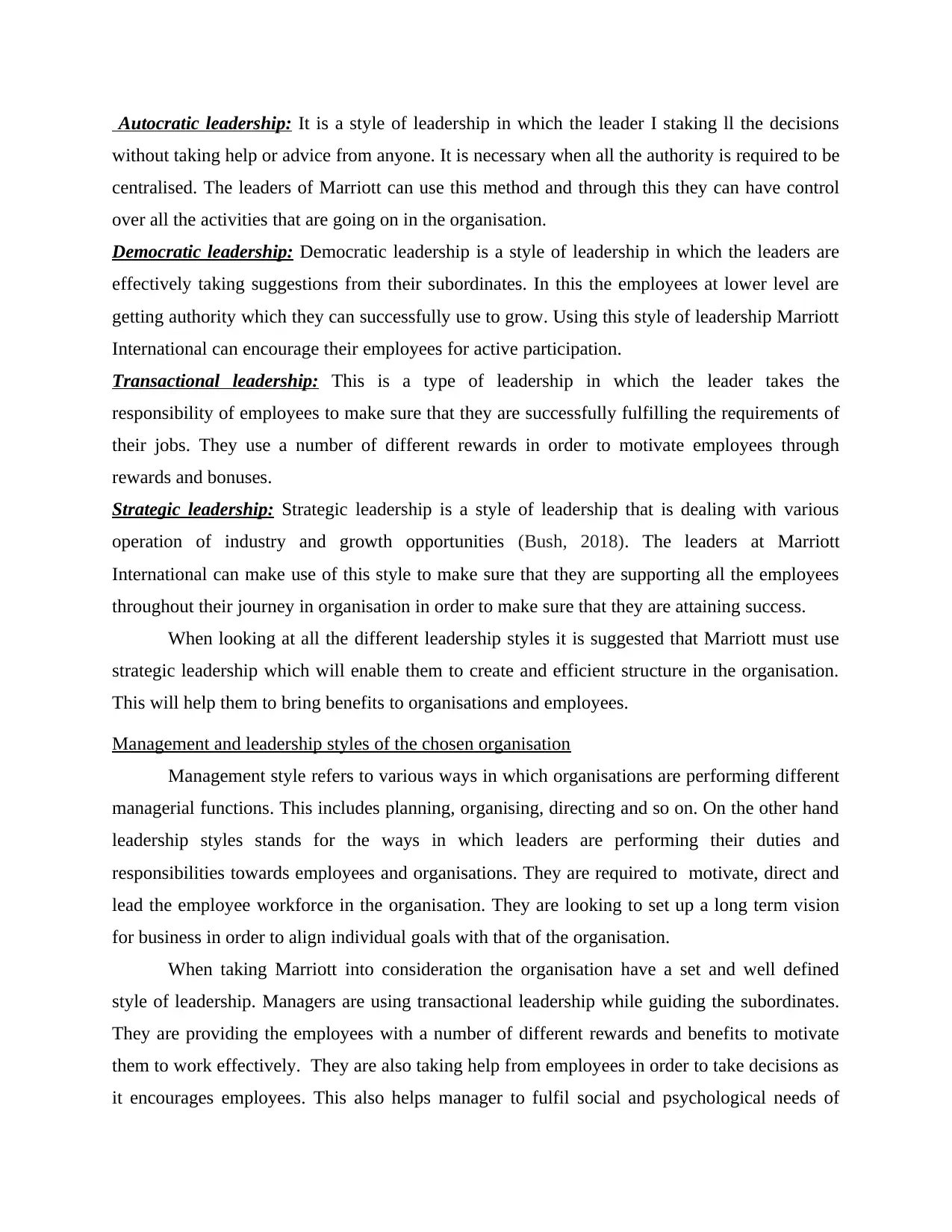
Autocratic leadership: It is a style of leadership in which the leader I staking ll the decisions
without taking help or advice from anyone. It is necessary when all the authority is required to be
centralised. The leaders of Marriott can use this method and through this they can have control
over all the activities that are going on in the organisation.
Democratic leadership: Democratic leadership is a style of leadership in which the leaders are
effectively taking suggestions from their subordinates. In this the employees at lower level are
getting authority which they can successfully use to grow. Using this style of leadership Marriott
International can encourage their employees for active participation.
Transactional leadership: This is a type of leadership in which the leader takes the
responsibility of employees to make sure that they are successfully fulfilling the requirements of
their jobs. They use a number of different rewards in order to motivate employees through
rewards and bonuses.
Strategic leadership: Strategic leadership is a style of leadership that is dealing with various
operation of industry and growth opportunities (Bush, 2018). The leaders at Marriott
International can make use of this style to make sure that they are supporting all the employees
throughout their journey in organisation in order to make sure that they are attaining success.
When looking at all the different leadership styles it is suggested that Marriott must use
strategic leadership which will enable them to create and efficient structure in the organisation.
This will help them to bring benefits to organisations and employees.
Management and leadership styles of the chosen organisation
Management style refers to various ways in which organisations are performing different
managerial functions. This includes planning, organising, directing and so on. On the other hand
leadership styles stands for the ways in which leaders are performing their duties and
responsibilities towards employees and organisations. They are required to motivate, direct and
lead the employee workforce in the organisation. They are looking to set up a long term vision
for business in order to align individual goals with that of the organisation.
When taking Marriott into consideration the organisation have a set and well defined
style of leadership. Managers are using transactional leadership while guiding the subordinates.
They are providing the employees with a number of different rewards and benefits to motivate
them to work effectively. They are also taking help from employees in order to take decisions as
it encourages employees. This also helps manager to fulfil social and psychological needs of
without taking help or advice from anyone. It is necessary when all the authority is required to be
centralised. The leaders of Marriott can use this method and through this they can have control
over all the activities that are going on in the organisation.
Democratic leadership: Democratic leadership is a style of leadership in which the leaders are
effectively taking suggestions from their subordinates. In this the employees at lower level are
getting authority which they can successfully use to grow. Using this style of leadership Marriott
International can encourage their employees for active participation.
Transactional leadership: This is a type of leadership in which the leader takes the
responsibility of employees to make sure that they are successfully fulfilling the requirements of
their jobs. They use a number of different rewards in order to motivate employees through
rewards and bonuses.
Strategic leadership: Strategic leadership is a style of leadership that is dealing with various
operation of industry and growth opportunities (Bush, 2018). The leaders at Marriott
International can make use of this style to make sure that they are supporting all the employees
throughout their journey in organisation in order to make sure that they are attaining success.
When looking at all the different leadership styles it is suggested that Marriott must use
strategic leadership which will enable them to create and efficient structure in the organisation.
This will help them to bring benefits to organisations and employees.
Management and leadership styles of the chosen organisation
Management style refers to various ways in which organisations are performing different
managerial functions. This includes planning, organising, directing and so on. On the other hand
leadership styles stands for the ways in which leaders are performing their duties and
responsibilities towards employees and organisations. They are required to motivate, direct and
lead the employee workforce in the organisation. They are looking to set up a long term vision
for business in order to align individual goals with that of the organisation.
When taking Marriott into consideration the organisation have a set and well defined
style of leadership. Managers are using transactional leadership while guiding the subordinates.
They are providing the employees with a number of different rewards and benefits to motivate
them to work effectively. They are also taking help from employees in order to take decisions as
it encourages employees. This also helps manager to fulfil social and psychological needs of
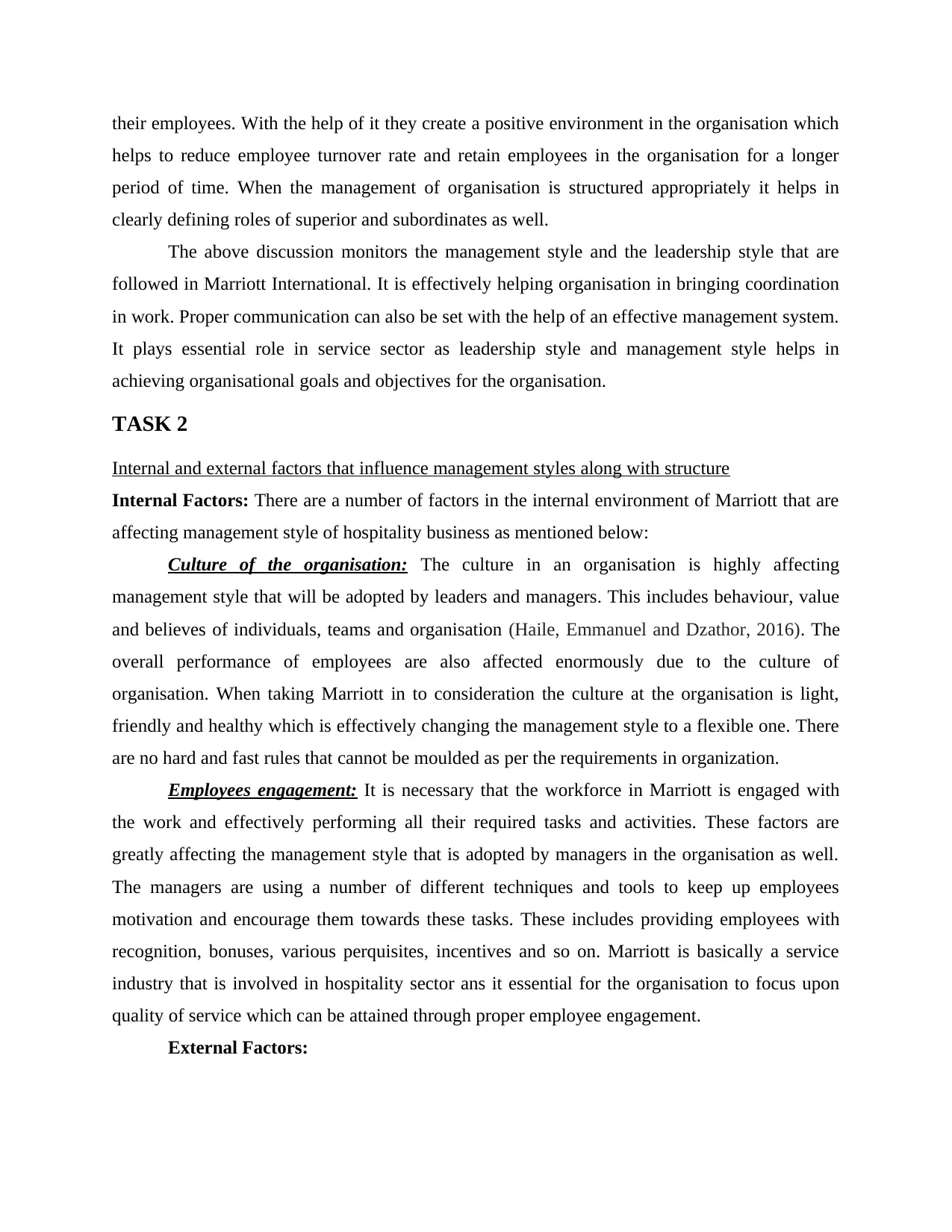
their employees. With the help of it they create a positive environment in the organisation which
helps to reduce employee turnover rate and retain employees in the organisation for a longer
period of time. When the management of organisation is structured appropriately it helps in
clearly defining roles of superior and subordinates as well.
The above discussion monitors the management style and the leadership style that are
followed in Marriott International. It is effectively helping organisation in bringing coordination
in work. Proper communication can also be set with the help of an effective management system.
It plays essential role in service sector as leadership style and management style helps in
achieving organisational goals and objectives for the organisation.
TASK 2
Internal and external factors that influence management styles along with structure
Internal Factors: There are a number of factors in the internal environment of Marriott that are
affecting management style of hospitality business as mentioned below:
Culture of the organisation: The culture in an organisation is highly affecting
management style that will be adopted by leaders and managers. This includes behaviour, value
and believes of individuals, teams and organisation (Haile, Emmanuel and Dzathor, 2016). The
overall performance of employees are also affected enormously due to the culture of
organisation. When taking Marriott in to consideration the culture at the organisation is light,
friendly and healthy which is effectively changing the management style to a flexible one. There
are no hard and fast rules that cannot be moulded as per the requirements in organization.
Employees engagement: It is necessary that the workforce in Marriott is engaged with
the work and effectively performing all their required tasks and activities. These factors are
greatly affecting the management style that is adopted by managers in the organisation as well.
The managers are using a number of different techniques and tools to keep up employees
motivation and encourage them towards these tasks. These includes providing employees with
recognition, bonuses, various perquisites, incentives and so on. Marriott is basically a service
industry that is involved in hospitality sector ans it essential for the organisation to focus upon
quality of service which can be attained through proper employee engagement.
External Factors:
helps to reduce employee turnover rate and retain employees in the organisation for a longer
period of time. When the management of organisation is structured appropriately it helps in
clearly defining roles of superior and subordinates as well.
The above discussion monitors the management style and the leadership style that are
followed in Marriott International. It is effectively helping organisation in bringing coordination
in work. Proper communication can also be set with the help of an effective management system.
It plays essential role in service sector as leadership style and management style helps in
achieving organisational goals and objectives for the organisation.
TASK 2
Internal and external factors that influence management styles along with structure
Internal Factors: There are a number of factors in the internal environment of Marriott that are
affecting management style of hospitality business as mentioned below:
Culture of the organisation: The culture in an organisation is highly affecting
management style that will be adopted by leaders and managers. This includes behaviour, value
and believes of individuals, teams and organisation (Haile, Emmanuel and Dzathor, 2016). The
overall performance of employees are also affected enormously due to the culture of
organisation. When taking Marriott in to consideration the culture at the organisation is light,
friendly and healthy which is effectively changing the management style to a flexible one. There
are no hard and fast rules that cannot be moulded as per the requirements in organization.
Employees engagement: It is necessary that the workforce in Marriott is engaged with
the work and effectively performing all their required tasks and activities. These factors are
greatly affecting the management style that is adopted by managers in the organisation as well.
The managers are using a number of different techniques and tools to keep up employees
motivation and encourage them towards these tasks. These includes providing employees with
recognition, bonuses, various perquisites, incentives and so on. Marriott is basically a service
industry that is involved in hospitality sector ans it essential for the organisation to focus upon
quality of service which can be attained through proper employee engagement.
External Factors:
⊘ This is a preview!⊘
Do you want full access?
Subscribe today to unlock all pages.

Trusted by 1+ million students worldwide
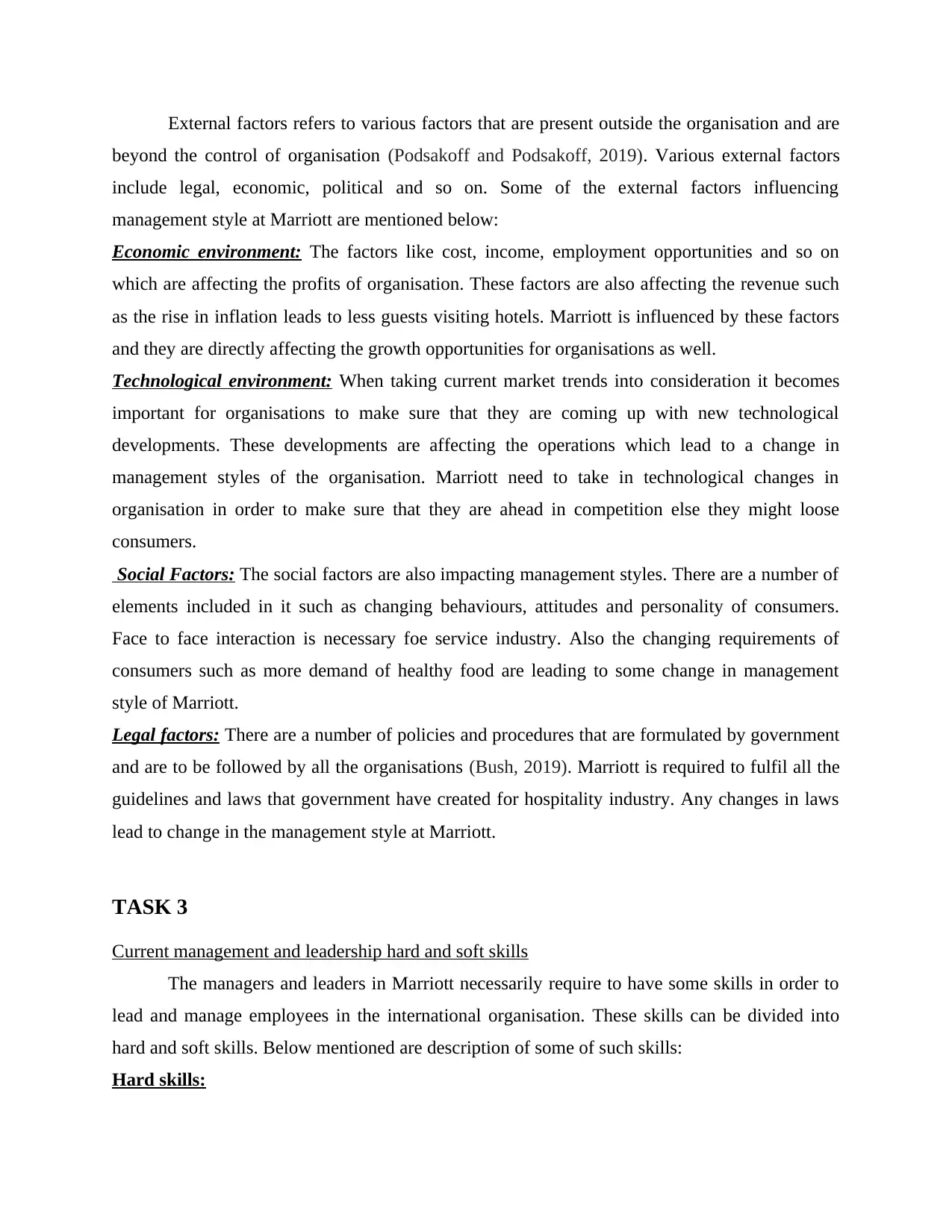
External factors refers to various factors that are present outside the organisation and are
beyond the control of organisation (Podsakoff and Podsakoff, 2019). Various external factors
include legal, economic, political and so on. Some of the external factors influencing
management style at Marriott are mentioned below:
Economic environment: The factors like cost, income, employment opportunities and so on
which are affecting the profits of organisation. These factors are also affecting the revenue such
as the rise in inflation leads to less guests visiting hotels. Marriott is influenced by these factors
and they are directly affecting the growth opportunities for organisations as well.
Technological environment: When taking current market trends into consideration it becomes
important for organisations to make sure that they are coming up with new technological
developments. These developments are affecting the operations which lead to a change in
management styles of the organisation. Marriott need to take in technological changes in
organisation in order to make sure that they are ahead in competition else they might loose
consumers.
Social Factors: The social factors are also impacting management styles. There are a number of
elements included in it such as changing behaviours, attitudes and personality of consumers.
Face to face interaction is necessary foe service industry. Also the changing requirements of
consumers such as more demand of healthy food are leading to some change in management
style of Marriott.
Legal factors: There are a number of policies and procedures that are formulated by government
and are to be followed by all the organisations (Bush, 2019). Marriott is required to fulfil all the
guidelines and laws that government have created for hospitality industry. Any changes in laws
lead to change in the management style at Marriott.
TASK 3
Current management and leadership hard and soft skills
The managers and leaders in Marriott necessarily require to have some skills in order to
lead and manage employees in the international organisation. These skills can be divided into
hard and soft skills. Below mentioned are description of some of such skills:
Hard skills:
beyond the control of organisation (Podsakoff and Podsakoff, 2019). Various external factors
include legal, economic, political and so on. Some of the external factors influencing
management style at Marriott are mentioned below:
Economic environment: The factors like cost, income, employment opportunities and so on
which are affecting the profits of organisation. These factors are also affecting the revenue such
as the rise in inflation leads to less guests visiting hotels. Marriott is influenced by these factors
and they are directly affecting the growth opportunities for organisations as well.
Technological environment: When taking current market trends into consideration it becomes
important for organisations to make sure that they are coming up with new technological
developments. These developments are affecting the operations which lead to a change in
management styles of the organisation. Marriott need to take in technological changes in
organisation in order to make sure that they are ahead in competition else they might loose
consumers.
Social Factors: The social factors are also impacting management styles. There are a number of
elements included in it such as changing behaviours, attitudes and personality of consumers.
Face to face interaction is necessary foe service industry. Also the changing requirements of
consumers such as more demand of healthy food are leading to some change in management
style of Marriott.
Legal factors: There are a number of policies and procedures that are formulated by government
and are to be followed by all the organisations (Bush, 2019). Marriott is required to fulfil all the
guidelines and laws that government have created for hospitality industry. Any changes in laws
lead to change in the management style at Marriott.
TASK 3
Current management and leadership hard and soft skills
The managers and leaders in Marriott necessarily require to have some skills in order to
lead and manage employees in the international organisation. These skills can be divided into
hard and soft skills. Below mentioned are description of some of such skills:
Hard skills:
Paraphrase This Document
Need a fresh take? Get an instant paraphrase of this document with our AI Paraphraser
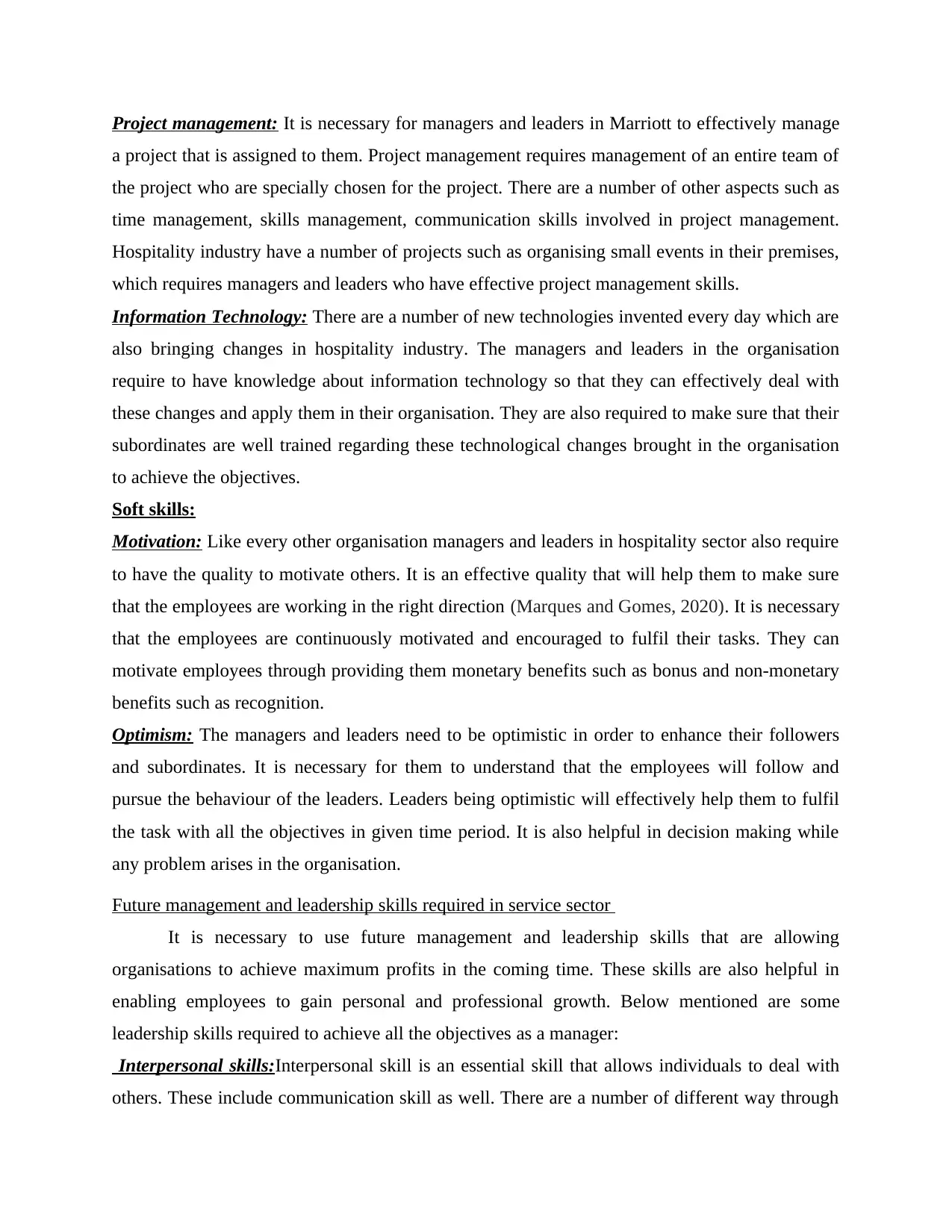
Project management: It is necessary for managers and leaders in Marriott to effectively manage
a project that is assigned to them. Project management requires management of an entire team of
the project who are specially chosen for the project. There are a number of other aspects such as
time management, skills management, communication skills involved in project management.
Hospitality industry have a number of projects such as organising small events in their premises,
which requires managers and leaders who have effective project management skills.
Information Technology: There are a number of new technologies invented every day which are
also bringing changes in hospitality industry. The managers and leaders in the organisation
require to have knowledge about information technology so that they can effectively deal with
these changes and apply them in their organisation. They are also required to make sure that their
subordinates are well trained regarding these technological changes brought in the organisation
to achieve the objectives.
Soft skills:
Motivation: Like every other organisation managers and leaders in hospitality sector also require
to have the quality to motivate others. It is an effective quality that will help them to make sure
that the employees are working in the right direction (Marques and Gomes, 2020). It is necessary
that the employees are continuously motivated and encouraged to fulfil their tasks. They can
motivate employees through providing them monetary benefits such as bonus and non-monetary
benefits such as recognition.
Optimism: The managers and leaders need to be optimistic in order to enhance their followers
and subordinates. It is necessary for them to understand that the employees will follow and
pursue the behaviour of the leaders. Leaders being optimistic will effectively help them to fulfil
the task with all the objectives in given time period. It is also helpful in decision making while
any problem arises in the organisation.
Future management and leadership skills required in service sector
It is necessary to use future management and leadership skills that are allowing
organisations to achieve maximum profits in the coming time. These skills are also helpful in
enabling employees to gain personal and professional growth. Below mentioned are some
leadership skills required to achieve all the objectives as a manager:
Interpersonal skills:Interpersonal skill is an essential skill that allows individuals to deal with
others. These include communication skill as well. There are a number of different way through
a project that is assigned to them. Project management requires management of an entire team of
the project who are specially chosen for the project. There are a number of other aspects such as
time management, skills management, communication skills involved in project management.
Hospitality industry have a number of projects such as organising small events in their premises,
which requires managers and leaders who have effective project management skills.
Information Technology: There are a number of new technologies invented every day which are
also bringing changes in hospitality industry. The managers and leaders in the organisation
require to have knowledge about information technology so that they can effectively deal with
these changes and apply them in their organisation. They are also required to make sure that their
subordinates are well trained regarding these technological changes brought in the organisation
to achieve the objectives.
Soft skills:
Motivation: Like every other organisation managers and leaders in hospitality sector also require
to have the quality to motivate others. It is an effective quality that will help them to make sure
that the employees are working in the right direction (Marques and Gomes, 2020). It is necessary
that the employees are continuously motivated and encouraged to fulfil their tasks. They can
motivate employees through providing them monetary benefits such as bonus and non-monetary
benefits such as recognition.
Optimism: The managers and leaders need to be optimistic in order to enhance their followers
and subordinates. It is necessary for them to understand that the employees will follow and
pursue the behaviour of the leaders. Leaders being optimistic will effectively help them to fulfil
the task with all the objectives in given time period. It is also helpful in decision making while
any problem arises in the organisation.
Future management and leadership skills required in service sector
It is necessary to use future management and leadership skills that are allowing
organisations to achieve maximum profits in the coming time. These skills are also helpful in
enabling employees to gain personal and professional growth. Below mentioned are some
leadership skills required to achieve all the objectives as a manager:
Interpersonal skills:Interpersonal skill is an essential skill that allows individuals to deal with
others. These include communication skill as well. There are a number of different way through
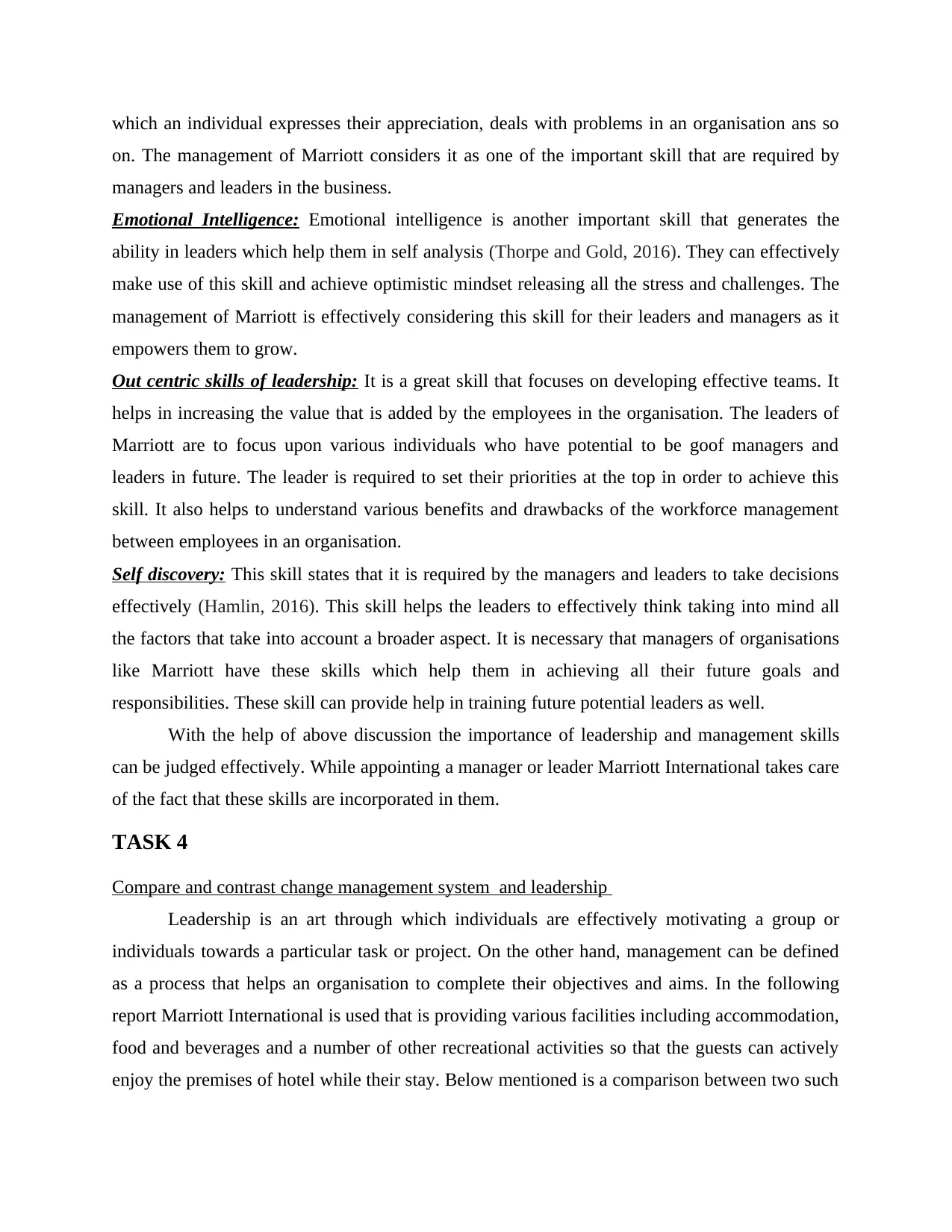
which an individual expresses their appreciation, deals with problems in an organisation ans so
on. The management of Marriott considers it as one of the important skill that are required by
managers and leaders in the business.
Emotional Intelligence: Emotional intelligence is another important skill that generates the
ability in leaders which help them in self analysis (Thorpe and Gold, 2016). They can effectively
make use of this skill and achieve optimistic mindset releasing all the stress and challenges. The
management of Marriott is effectively considering this skill for their leaders and managers as it
empowers them to grow.
Out centric skills of leadership: It is a great skill that focuses on developing effective teams. It
helps in increasing the value that is added by the employees in the organisation. The leaders of
Marriott are to focus upon various individuals who have potential to be goof managers and
leaders in future. The leader is required to set their priorities at the top in order to achieve this
skill. It also helps to understand various benefits and drawbacks of the workforce management
between employees in an organisation.
Self discovery: This skill states that it is required by the managers and leaders to take decisions
effectively (Hamlin, 2016). This skill helps the leaders to effectively think taking into mind all
the factors that take into account a broader aspect. It is necessary that managers of organisations
like Marriott have these skills which help them in achieving all their future goals and
responsibilities. These skill can provide help in training future potential leaders as well.
With the help of above discussion the importance of leadership and management skills
can be judged effectively. While appointing a manager or leader Marriott International takes care
of the fact that these skills are incorporated in them.
TASK 4
Compare and contrast change management system and leadership
Leadership is an art through which individuals are effectively motivating a group or
individuals towards a particular task or project. On the other hand, management can be defined
as a process that helps an organisation to complete their objectives and aims. In the following
report Marriott International is used that is providing various facilities including accommodation,
food and beverages and a number of other recreational activities so that the guests can actively
enjoy the premises of hotel while their stay. Below mentioned is a comparison between two such
on. The management of Marriott considers it as one of the important skill that are required by
managers and leaders in the business.
Emotional Intelligence: Emotional intelligence is another important skill that generates the
ability in leaders which help them in self analysis (Thorpe and Gold, 2016). They can effectively
make use of this skill and achieve optimistic mindset releasing all the stress and challenges. The
management of Marriott is effectively considering this skill for their leaders and managers as it
empowers them to grow.
Out centric skills of leadership: It is a great skill that focuses on developing effective teams. It
helps in increasing the value that is added by the employees in the organisation. The leaders of
Marriott are to focus upon various individuals who have potential to be goof managers and
leaders in future. The leader is required to set their priorities at the top in order to achieve this
skill. It also helps to understand various benefits and drawbacks of the workforce management
between employees in an organisation.
Self discovery: This skill states that it is required by the managers and leaders to take decisions
effectively (Hamlin, 2016). This skill helps the leaders to effectively think taking into mind all
the factors that take into account a broader aspect. It is necessary that managers of organisations
like Marriott have these skills which help them in achieving all their future goals and
responsibilities. These skill can provide help in training future potential leaders as well.
With the help of above discussion the importance of leadership and management skills
can be judged effectively. While appointing a manager or leader Marriott International takes care
of the fact that these skills are incorporated in them.
TASK 4
Compare and contrast change management system and leadership
Leadership is an art through which individuals are effectively motivating a group or
individuals towards a particular task or project. On the other hand, management can be defined
as a process that helps an organisation to complete their objectives and aims. In the following
report Marriott International is used that is providing various facilities including accommodation,
food and beverages and a number of other recreational activities so that the guests can actively
enjoy the premises of hotel while their stay. Below mentioned is a comparison between two such
⊘ This is a preview!⊘
Do you want full access?
Subscribe today to unlock all pages.

Trusted by 1+ million students worldwide
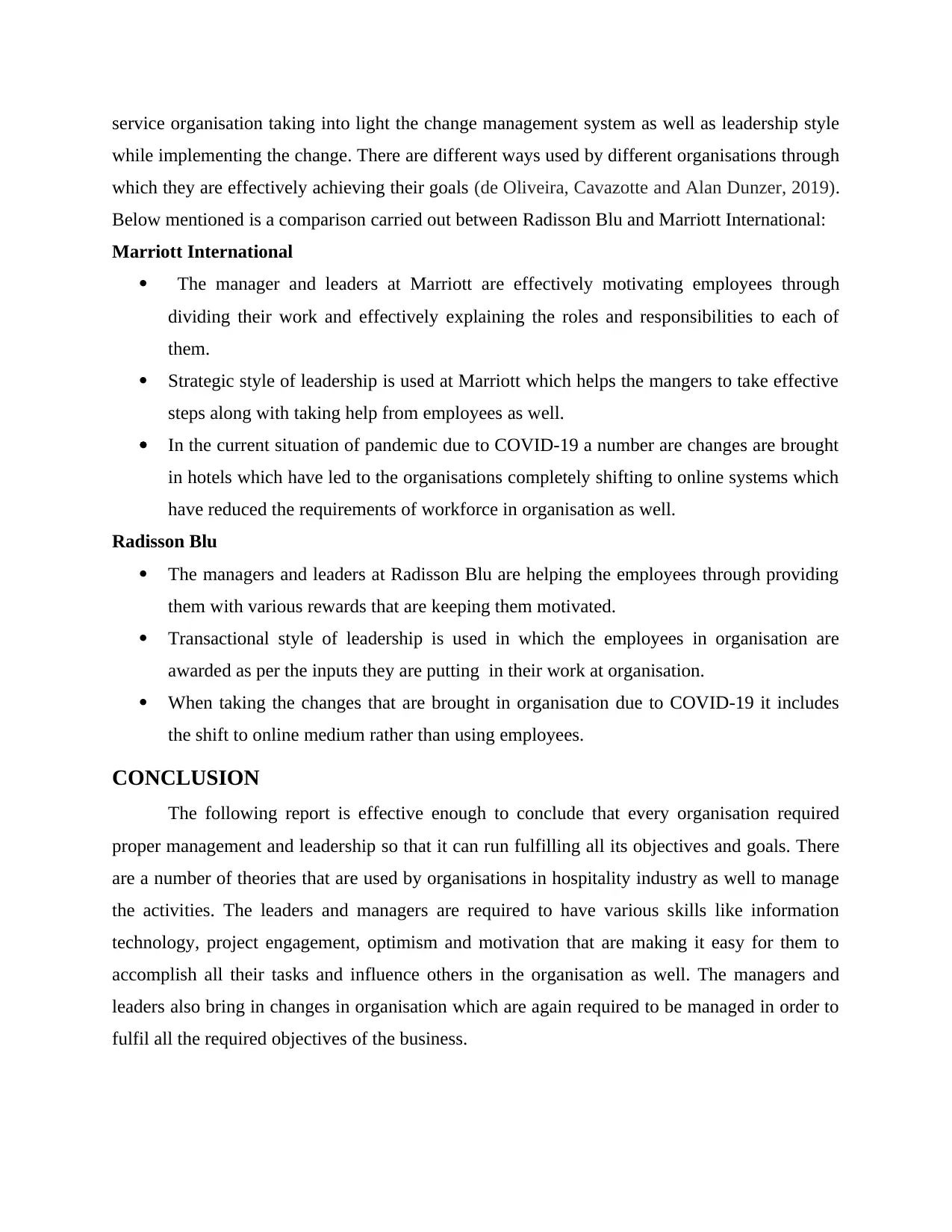
service organisation taking into light the change management system as well as leadership style
while implementing the change. There are different ways used by different organisations through
which they are effectively achieving their goals (de Oliveira, Cavazotte and Alan Dunzer, 2019).
Below mentioned is a comparison carried out between Radisson Blu and Marriott International:
Marriott International
The manager and leaders at Marriott are effectively motivating employees through
dividing their work and effectively explaining the roles and responsibilities to each of
them.
Strategic style of leadership is used at Marriott which helps the mangers to take effective
steps along with taking help from employees as well.
In the current situation of pandemic due to COVID-19 a number are changes are brought
in hotels which have led to the organisations completely shifting to online systems which
have reduced the requirements of workforce in organisation as well.
Radisson Blu
The managers and leaders at Radisson Blu are helping the employees through providing
them with various rewards that are keeping them motivated.
Transactional style of leadership is used in which the employees in organisation are
awarded as per the inputs they are putting in their work at organisation.
When taking the changes that are brought in organisation due to COVID-19 it includes
the shift to online medium rather than using employees.
CONCLUSION
The following report is effective enough to conclude that every organisation required
proper management and leadership so that it can run fulfilling all its objectives and goals. There
are a number of theories that are used by organisations in hospitality industry as well to manage
the activities. The leaders and managers are required to have various skills like information
technology, project engagement, optimism and motivation that are making it easy for them to
accomplish all their tasks and influence others in the organisation as well. The managers and
leaders also bring in changes in organisation which are again required to be managed in order to
fulfil all the required objectives of the business.
while implementing the change. There are different ways used by different organisations through
which they are effectively achieving their goals (de Oliveira, Cavazotte and Alan Dunzer, 2019).
Below mentioned is a comparison carried out between Radisson Blu and Marriott International:
Marriott International
The manager and leaders at Marriott are effectively motivating employees through
dividing their work and effectively explaining the roles and responsibilities to each of
them.
Strategic style of leadership is used at Marriott which helps the mangers to take effective
steps along with taking help from employees as well.
In the current situation of pandemic due to COVID-19 a number are changes are brought
in hotels which have led to the organisations completely shifting to online systems which
have reduced the requirements of workforce in organisation as well.
Radisson Blu
The managers and leaders at Radisson Blu are helping the employees through providing
them with various rewards that are keeping them motivated.
Transactional style of leadership is used in which the employees in organisation are
awarded as per the inputs they are putting in their work at organisation.
When taking the changes that are brought in organisation due to COVID-19 it includes
the shift to online medium rather than using employees.
CONCLUSION
The following report is effective enough to conclude that every organisation required
proper management and leadership so that it can run fulfilling all its objectives and goals. There
are a number of theories that are used by organisations in hospitality industry as well to manage
the activities. The leaders and managers are required to have various skills like information
technology, project engagement, optimism and motivation that are making it easy for them to
accomplish all their tasks and influence others in the organisation as well. The managers and
leaders also bring in changes in organisation which are again required to be managed in order to
fulfil all the required objectives of the business.
Paraphrase This Document
Need a fresh take? Get an instant paraphrase of this document with our AI Paraphraser
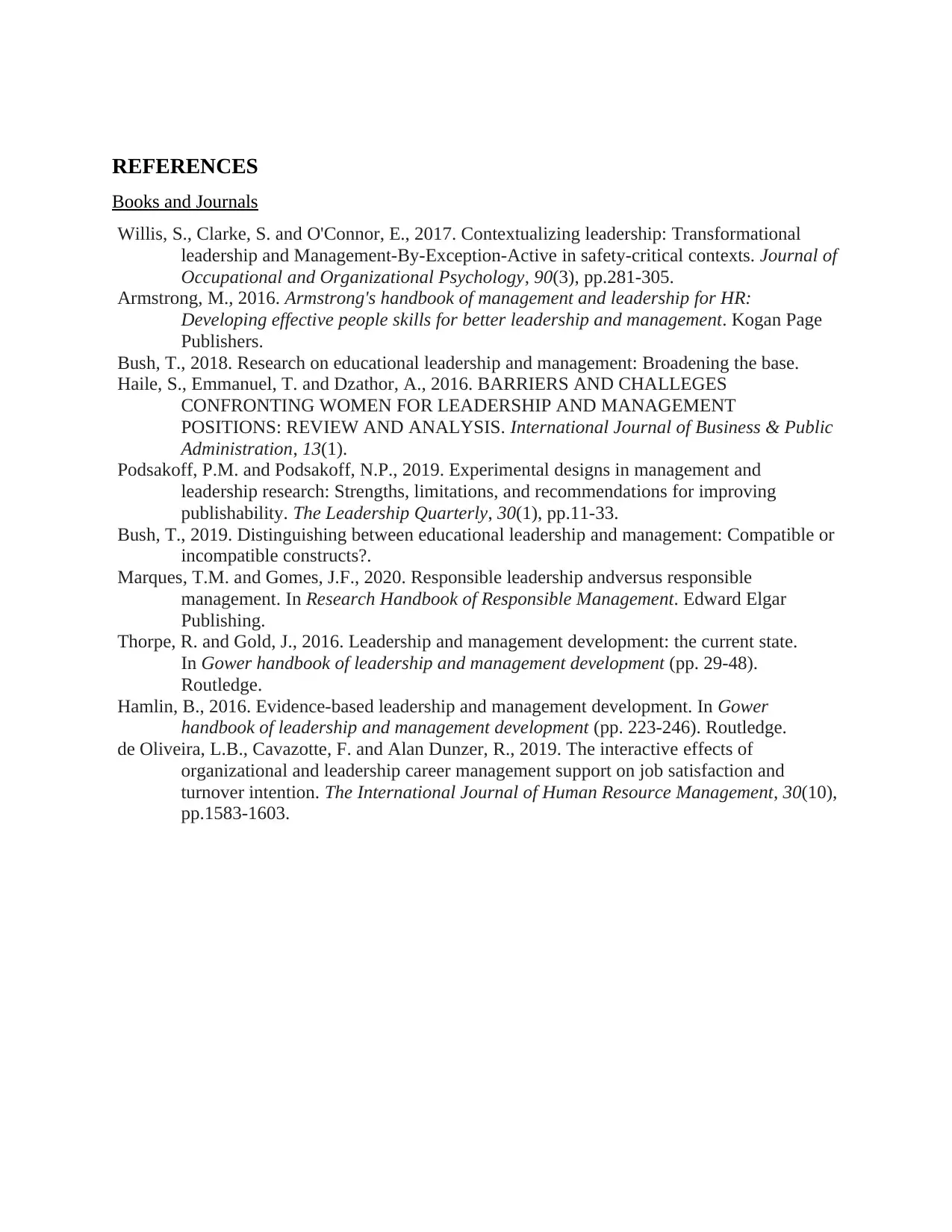
REFERENCES
Books and Journals
Willis, S., Clarke, S. and O'Connor, E., 2017. Contextualizing leadership: Transformational
leadership and Management‐By‐Exception‐Active in safety‐critical contexts. Journal of
Occupational and Organizational Psychology, 90(3), pp.281-305.
Armstrong, M., 2016. Armstrong's handbook of management and leadership for HR:
Developing effective people skills for better leadership and management. Kogan Page
Publishers.
Bush, T., 2018. Research on educational leadership and management: Broadening the base.
Haile, S., Emmanuel, T. and Dzathor, A., 2016. BARRIERS AND CHALLEGES
CONFRONTING WOMEN FOR LEADERSHIP AND MANAGEMENT
POSITIONS: REVIEW AND ANALYSIS. International Journal of Business & Public
Administration, 13(1).
Podsakoff, P.M. and Podsakoff, N.P., 2019. Experimental designs in management and
leadership research: Strengths, limitations, and recommendations for improving
publishability. The Leadership Quarterly, 30(1), pp.11-33.
Bush, T., 2019. Distinguishing between educational leadership and management: Compatible or
incompatible constructs?.
Marques, T.M. and Gomes, J.F., 2020. Responsible leadership andversus responsible
management. In Research Handbook of Responsible Management. Edward Elgar
Publishing.
Thorpe, R. and Gold, J., 2016. Leadership and management development: the current state.
In Gower handbook of leadership and management development (pp. 29-48).
Routledge.
Hamlin, B., 2016. Evidence-based leadership and management development. In Gower
handbook of leadership and management development (pp. 223-246). Routledge.
de Oliveira, L.B., Cavazotte, F. and Alan Dunzer, R., 2019. The interactive effects of
organizational and leadership career management support on job satisfaction and
turnover intention. The International Journal of Human Resource Management, 30(10),
pp.1583-1603.
Books and Journals
Willis, S., Clarke, S. and O'Connor, E., 2017. Contextualizing leadership: Transformational
leadership and Management‐By‐Exception‐Active in safety‐critical contexts. Journal of
Occupational and Organizational Psychology, 90(3), pp.281-305.
Armstrong, M., 2016. Armstrong's handbook of management and leadership for HR:
Developing effective people skills for better leadership and management. Kogan Page
Publishers.
Bush, T., 2018. Research on educational leadership and management: Broadening the base.
Haile, S., Emmanuel, T. and Dzathor, A., 2016. BARRIERS AND CHALLEGES
CONFRONTING WOMEN FOR LEADERSHIP AND MANAGEMENT
POSITIONS: REVIEW AND ANALYSIS. International Journal of Business & Public
Administration, 13(1).
Podsakoff, P.M. and Podsakoff, N.P., 2019. Experimental designs in management and
leadership research: Strengths, limitations, and recommendations for improving
publishability. The Leadership Quarterly, 30(1), pp.11-33.
Bush, T., 2019. Distinguishing between educational leadership and management: Compatible or
incompatible constructs?.
Marques, T.M. and Gomes, J.F., 2020. Responsible leadership andversus responsible
management. In Research Handbook of Responsible Management. Edward Elgar
Publishing.
Thorpe, R. and Gold, J., 2016. Leadership and management development: the current state.
In Gower handbook of leadership and management development (pp. 29-48).
Routledge.
Hamlin, B., 2016. Evidence-based leadership and management development. In Gower
handbook of leadership and management development (pp. 223-246). Routledge.
de Oliveira, L.B., Cavazotte, F. and Alan Dunzer, R., 2019. The interactive effects of
organizational and leadership career management support on job satisfaction and
turnover intention. The International Journal of Human Resource Management, 30(10),
pp.1583-1603.
1 out of 11
Related Documents
Your All-in-One AI-Powered Toolkit for Academic Success.
+13062052269
info@desklib.com
Available 24*7 on WhatsApp / Email
![[object Object]](/_next/static/media/star-bottom.7253800d.svg)
Unlock your academic potential
Copyright © 2020–2026 A2Z Services. All Rights Reserved. Developed and managed by ZUCOL.





